英汉语言对比分析期末考试资料 - 副本
英汉语言对比复习资料
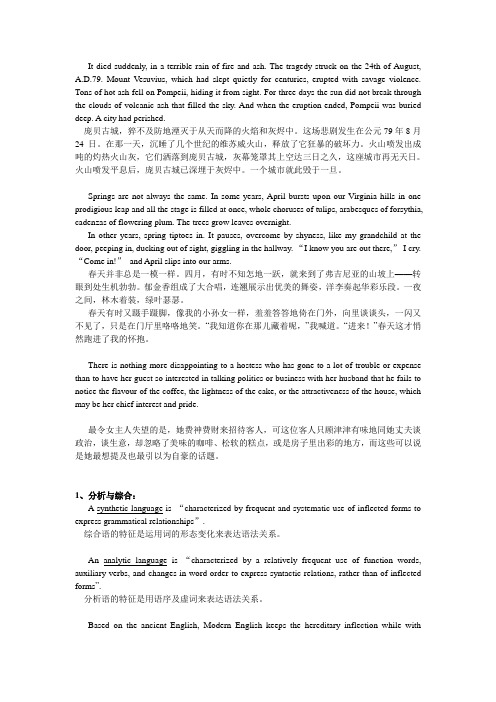
It died suddenly, in a terrible rain of fire and ash. The tragedy struck on the 24th of August, A.D.79. Mount Vesuvius, which had slept quietly for centuries, erupted with savage violence. Tons of hot ash fell on Pompeii, hiding it from sight. For three days the sun did not break through the clouds of volcanic ash that filled the sky. And when the eruption ended, Pompeii was buried deep. A city had perished.庞贝古城,猝不及防地湮灭于从天而降的火焰和灰烬中。
这场悲剧发生在公元79年8月24日。
在那一天,沉睡了几个世纪的维苏威火山,释放了它狂暴的破坏力。
火山喷发出成吨的灼热火山灰,它们洒落到庞贝古城,灰幕笼罩其上空达三日之久,这座城市再无天日。
火山喷发平息后,庞贝古城已深埋于灰烬中。
一个城市就此毁于一旦。
Springs are not always the same. In some years, April bursts upon our Virginia hills in one prodigious leap and all the stage is filled at once, whole choruses of tulips, arabesques of forsythia, cadenzas of flowering plum. The trees grow leaves overnight.In other years, spring tiptoes in. It pauses, overcome by shyness, like my grandchild at the door, peeping in, ducking out of sight, giggling in the hallway. “I know you are out there,”I cry. “Come in!”and April slips into our arms.春天并非总是一模一样。
汉英语言对比 期末考试
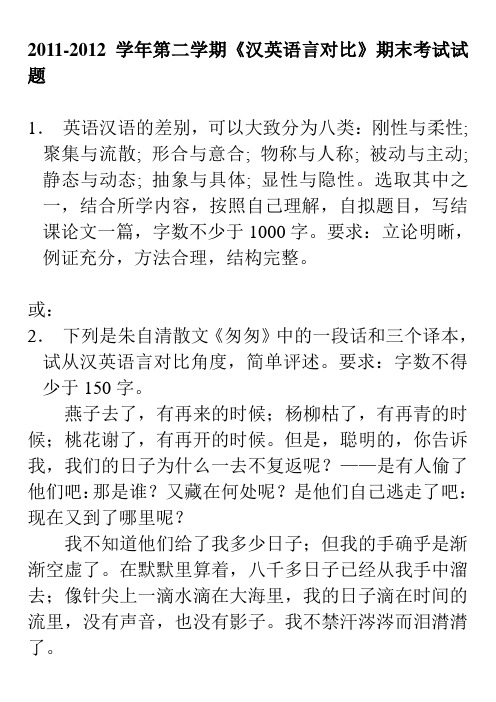
2011-2012学年第二学期《汉英语言对比》期末考试试题1.英语汉语的差别,可以大致分为八类:刚性与柔性; 聚集与流散; 形合与意合; 物称与人称; 被动与主动; 静态与动态; 抽象与具体; 显性与隐性。
选取其中之一,结合所学内容,按照自己理解,自拟题目,写结课论文一篇,字数不少于1000字。
要求:立论明晰,例证充分,方法合理,结构完整。
或:2.下列是朱自清散文《匆匆》中的一段话和三个译本,试从汉英语言对比角度,简单评述。
要求:字数不得少于150字。
燕子去了,有再来的时候;杨柳枯了,有再青的时候;桃花谢了,有再开的时候。
但是,聪明的,你告诉我,我们的日子为什么一去不复返呢?——是有人偷了他们吧:那是谁?又藏在何处呢?是他们自己逃走了吧:现在又到了哪里呢?我不知道他们给了我多少日子;但我的手确乎是渐渐空虚了。
在默默里算着,八千多日子已经从我手中溜去;像针尖上一滴水滴在大海里,我的日子滴在时间的流里,没有声音,也没有影子。
我不禁汗涔涔而泪潸潸了。
1)Rush (translated by Zhu Chunshen)Swallows may have gone, but there is a time of return; willow trees may have died back, but there is a time of re-greening; peach blossoms may have fallen, but they will bloom again. Now, you the wise, tell me, why should our days leave us, never to return? — If they had been stolen by someone, who could it be? Where could he hide then? If they had made the escape themselves, then where could they stay at the moment?I do not know how many days I have been given to spend, but I do feel my hands are getting empty. Taking stock silently, I find that more than eight thousand days has already slid away from me. Like a drop of water from the point of a needle disappearing into the ocean, my days are dripping into the stream of time, soundless, traceless. Already sweat is starting on my forehead, and tears welling up in my eyes.2)Transient Days (translated by Zhang Peiji)If swallows go away, they will come back again. If willows wither, they will turn green again. If peach blossoms fade, they will flower again. But, tell me, you the wise, why should our days go by never to return? Perhaps they have been stolen by someone. But who could it be and where could he hide them? Perhaps they have just run away by themselves. But where could they be at the present moment?I don't know how many days I am entitled to altogether, but my quota of them is undoubtedly wearing away. Counting up silently, I find that more than 8,000 days have already slipped away through my fingers. Like a drop of water falling off a needle point into the ocean, my days are quietly dripping into the stream of time without leaving a trace. At the thought of this, sweat oozes from my forehead and tears trickle down my cheeks.3)Days Gone By (translated by Zhang Mengjing)When the swallows have gone, there is still time to return; when the poplar and willow trees have become withered, there is still time to see green; when the peach flowers have already faded, there is still time to blossom. But please tell me, the genius, why then have my days gone and never returned? If some people have stolen them, then who are they? And where are they hidden? If they have escaped by themselves, then where are they now?I don't know how many days I have been given, but the in my hands are becoming numbered. Counting silently, eight thousand days have slipped by. Just like water drops a pinpoint dripping slowly into the vast ocean, my days been dripping into the river of time, quietly and invisibly. I can’t help dripping with sweat and weeping many tears.注:格式:5号宋体(英语部分用times new roman),题目用黑体。
英汉语言对比考试复习资料
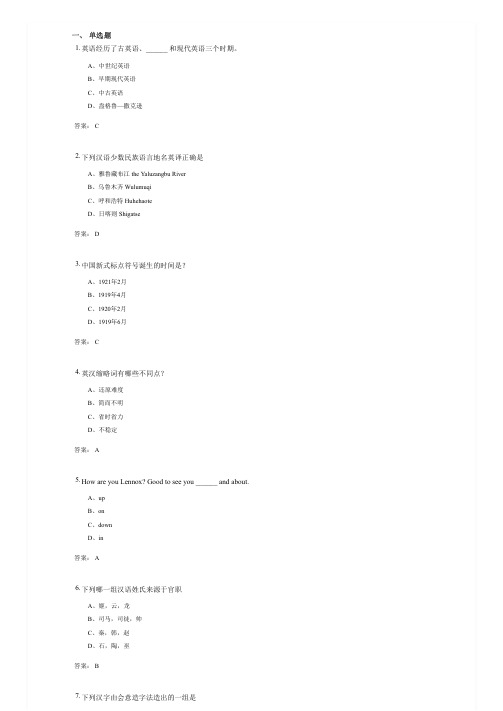
一、单选题1.英语经历了古英语、______ 和现代英语三个时期。
A、中世纪英语B、早期现代英语C、中古英语D、盎格鲁—撒克逊答案: C2.下列汉语少数民族语言地名英译正确是A、雅鲁藏布江 the Yaluzangbu RiverB、乌鲁木齐 WulumuqiC、呼和浩特 HuhehaoteD、日喀则 Shigatse答案: D3.中国新式标点符号诞生的时间是?A、1921年2月B、1919年4月C、1920年2月D、1919年6月答案: C4.英汉缩略词有哪些不同点?A、还原难度B、简而不明C、省时省力D、不稳定答案: A5.How are you Lennox? Good to see you ______ and about.A、upB、onC、downD、in答案: A6.下列哪一组汉语姓氏来源于官职A、姬,云,龙B、司马,司徒,帅C、秦,韩,赵D、石,陶,巫答案: B7.下列汉字由会意造字法造出的一组是A、明武信林B、拉河山森C、忘想小大D、武木林足答案: A8.“pull one's leg”的译文是______?A、扯后腿B、开玩笑C、赶紧,快点D、阻止某人答案: B二、判断题1.综合语的特征是运用词的形态变化来表达语法关系。
A、正确B、错误答案:正确2.分析语的特征是用语序及虚词来表达语法关系。
A、正确B、错误答案:正确3.“我家的后面有一个很大的园,相传叫作百草园。
”该句最符合英语表达习惯的译文是Behind our house was a great garden commonly known as Hundred-plant Garden.A、正确B、错误答案:正确4.汉语句子流散的原因:缺乏形态变化、固定语序、主题突出特点、主语跳跃A、正确B、错误答案:正确5.She is such a trouble-maker that no one likes to be in the same team with her.该句最符合汉语表达习惯的译文是她是个会制造麻烦的人,没人愿意跟她呆在一组。
【全文】英汉语言对比_3
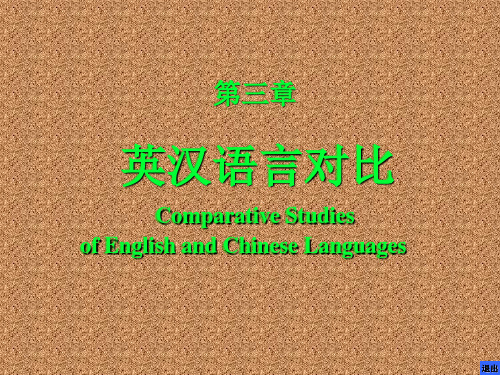
在跨语言、跨文化的翻译交际过程中,难 免会出现差异,探索语言、文化的差异性并分 析其原因,有利于避免产生失误,提高翻译质 量。我们知道,英语重客体,重形式上的逻辑 关系;汉语重关系,重意合,重主体。汉语重 人际关系;英语重客观事实。汉语重含蓄;英 语重精确。这便是英汉两种语言在风格上和文 化上的差异,正是这种文化差异造成了翻译中 的障碍和难题。
19 返回章重点 退出
例3:He tried to seem angry, but his smile betrayed him.
A. 他装出生气的样子,可是笑容暴露了他的真实情 感。
B. 他试图看上去是生气的样子,但是他的笑容背叛 了他。
C. 他试图生气忍住不笑。 D. 他心里很生气,却笑不出来。
3. 1. 1 英语重形合,汉语重意合
英语重形合(hypotaxis)是指英语语言符号之间有较强 的逻辑关系;汉语重意合(parataxis)是指汉语句子主要通 过字词的意义连结起来。汉字起源于象形文字,文字的图 形表示其意义,并引起意义上的联想,发展形象思维;英 语是拼音文字,字母是基本的文字表达符号,词的拼写与 发音按一定的发音规则形成逻辑关系,而字母对意义而言 只是意义的替代符号,语言信息的表达依靠符号按一定的 语法逻辑关系排列组合,所以说英语是一种重形式逻辑的 语言。
语言的表达方式不仅与文化有着密切的关系, 而且与思维及逻辑方式有着密切的关系。这种思维 及逻辑方式的差异在语言表达方式上的表现既存在 于语篇的思路和结构上,也存在于句子水平上。
9 返回章重点 退出
3. 1英汉语言特征对比
Comparisons between English and Chinese Language Features
英汉语言对比-习题_+答案汇编
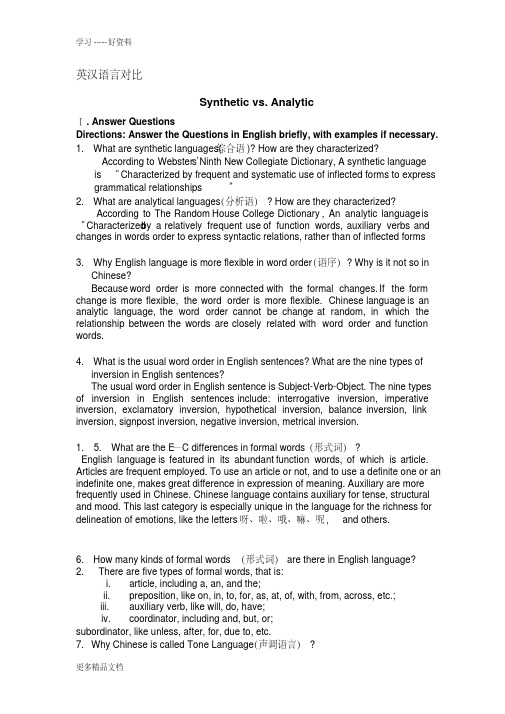
3. Why English language is more flexible in word orde(r 语序)? Why is it not so in Chinese? Because word order is more connected with the formal changes. If the form
4. What is the usual word order in English sentences? What are the nine types of
inversion in English sentences? The usual word order in English sentence is Subject-Verb-Object. The nine types of inversion in English sentences include: interrogative inversion, imperative inversion, exclamatory inversion, hypothetical inversion, balance inversion, link inversion, signpost inversion, negative inversion, metrical inversion.
6. How many kinds of formal words (形式词) are there in English language? 2. There are five types of formal words, that is:
i. article, including a, an, and the; ii. preposition, like on, in, to, for, as, at, of, with, from, across, etc.; iii. auxiliary verb, like will, do, have; iv. coordinator, including and, but, or; subordinator, like unless, after, for, due to, etc. 7. Why Chinese is called Tone Language(声调语言) ?
Lecture 1(英汉句法与段落结构的比较) - 副本
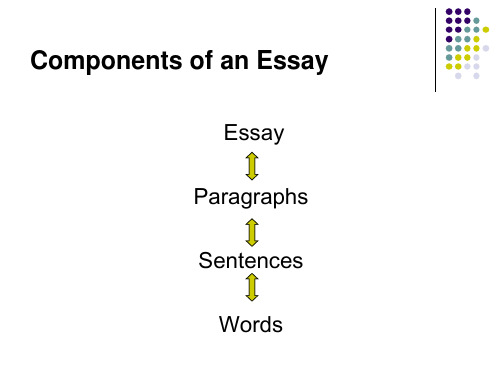
变竹竿为树状
改变大量使用简单句和并列句的倾向。 树状句能更好地表达句内的逻辑关系。
练习:
1.
2.
3.
Shanghai means “above the sea”. It is on the Huangpu River. The Huangpu River is the lower tributary at the mouth of the Yangtze. Energy is much needed now. And nuclear plants are clean and economical. They can produce vast amount of energy. But many people are very concerned about safety. They hold a strong negative attitude towards them. The rural area is far from the city, and lack transport facilities. This makes it isolated from the outside world. And because it is difficult to access information this isolation is compound.
抽象名词化: 用名词表示动作
College life makes me feel excited. College life filled me with excitement. If you compare the two ways of life carefully, you will find the former is superior to the latter. Careful comparison of the two ways of life will show the superiority of the former over the latter.
英汉语言对比分析期末考试资料 - 副本
一引入1.What Is Language Transfer?谈谈自己的想法并举两个例子Transfer is the influence resulting from the similarities and differences between the target language and any other language that has been previously acquired . Odlin (1989: 27)迁移是由于目标语与已经习得的语言之间的相似和差异而产生的影响。
奥德林Keen awareness of the similarities and differences between the two languages can facilitate FL learning.对两种语言相似与相异点的敏锐意识能促进外语学习。
Examples of Negative Transfer:He only eat two meal a day. Morphological transfer (词形迁移)Neither nouns nor verbs have inflections in Chinese. 在汉语中,名词和动词都没有形态变化。
Shanghai is said to have thirteen million population. Collocation transfer (搭配迁移)The noun renkou, the Chinese equivalent of ‘population’, can have a numerical pre-modifier. Population的汉语对应词“人口”在汉语中可以用前置数词来修饰。
Chinese EnglishMeaning-focused with emphasis on implicit coherence (隐性连贯)Paratactic语义型语言(以意统形) Form-focused with emphasis on explicit cohesion(显性联接)Hypotactic形态型语言(以形驭意)left-extending, heavy-headed like a lion狮子型语言right-extending heavy-tailed like a peacock孔雀型语言moving point of sight(视点流动)fixed point of sight(视点固定)bamboo-like sentence structure(竹式结构)with different sections linked and yet separated tree-like sentence structure (树式结构)with different parts connected like branches and sub-branches to the trunk lineTopic-Comment Sentence Structure (话题-评论结构)Topic-prominent Language话题突出型语言Subject-Predicate Sentence Structure (主语-谓语结构)Subject-prominent Language主语突出型语言Order of linguistic elements: relatively fixed like bamboo-making (制竹)(语序相对固定)Order of linguistic elements: relatively flexible like block-building (积木)(语序相对灵活)3.中文的竹式结构,英文的树式结构能够举例说明从前这里有一个渔村,村里住着十户人家,这十户人家全靠打鱼、种地为生,生活艰苦,但很安宁。
英汉对比研究试题答案
英汉对比研究试题答案一、选择题1. 在英语中,以下哪项最能体现主语的人称和数的变化?A. 动词的形式B. 名词的复数形式C. 代词的格D. 介词的用法答案:A2. 汉语中的成语通常具有以下哪个特点?A. 通常由四个汉字组成B. 通常由两个汉字组成C. 有固定的词序和结构D. 可以自由组合创造新成语答案:A3. 在英语中,使用哪种方式可以更好地表达时间的先后顺序?A. 倒装句B. 从句C. 并列句D. 虚拟语气答案:B4. 汉语的语序对于句子意义的影响主要体现在哪个方面?A. 主谓一致B. 修饰语的位置C. 动词的时态D. 名词的数答案:B5. 英语中的动词时态主要用来表达什么?A. 说话者的情绪B. 动作发生的时间和状态C. 句子的连贯性D. 语气的强度答案:B二、填空题1. 在英语中,第三人称单数的现在时动词通常需要在词尾加上________。
答案:-s2. 汉语中的量词用于表示事物的数量,而在英语中,通常使用________来表示类似的功能。
答案:冠词3. 英语中的虚拟语气多用于表达非现实情况,如假设、建议等,而在汉语中,通常使用________来表达类似的语气。
答案:情态动词4. 汉语中的成语往往具有深厚的文化内涵和历史背景,而在英语中,相应的表达方式可能是________。
答案:习语或idiom5. 英语中的名词有可数和不可数之分,而在汉语中,名词通常可以通过________来表示数量。
答案:量词三、简答题1. 请简述英语中的被动语态及其用法。
答:被动语态是英语中的一种语态,用来强调动作的承受者而非执行者。
它通过使用“be”动词的适当形式加上主动语态动词的过去分词来构成。
被动语态常用于当动作的执行者未知、不重要或希望突出动作承受者时。
2. 汉语中的“把”字句和“被”字句有什么区别?答:“把”字句和“被”字句都是汉语中用来表示动作和受事的结构。
不同之处在于,“把”字句强调动作的完成和受事的改变,通常用于有具体结果的情境;而“被”字句则强调受事的被动状态,不一定要求动作完成,更多地用于表达受事的遭遇或经历。
英汉语言比较期末作业(1)
英汉语言比较期末作业1)A reader’s perception of the loose, slangy, colloquial, shirt-sleeved quality of much modern prose will be sharpened if he has experienced the conscious elegance of eighteenth-century writers and the solemn lecture-hall pronouncements of the Victorians.如果一个读者体会过18世纪时期作家的作品的优雅又读过维多利亚时代的演讲厅里的庄重的演讲,那么他就能深刻地体会现代散文的那种洒脱松散、口语化、多用俚语的语言风格。
2)Based on national realities and taking reasonable aspects of foreign economies, Chinese economists are working to establish socialist market economy, which ensures economic activities follow the requirements of the law of value and the changing relationship between supply and demand.在立足于本国实际以及借鉴外国合理的经济基础之上,中国经济学家正在为建立一个社会主义市场经济而工作着,这种经济形态要求满足价值规律的要求以及供求之间关系的变化。
3)There are few moments in life that bring husband and wife closer in reflective communion than the first October moment by a blazing hearth when they inhale the odor of mothballs in each other’s sweaters and agree it’s time they once again had a long talk.一生能有一些时刻能让妻子和丈夫进行促膝长谈的;十月初,夫妻俩互相依偎在暖暖的火炉旁坐着,当闻到对方毛衣里所发出来的卫生球的气味时,他们一致认为该是他们再次进行一次长谈的时候了。
英汉语言对比试卷
2008—2009学年第二学期《汉英语言对比》期末考试试卷西安科技大学外国语学院 07级饶深山 0712010221关于聚集于流散的看法聚集于流散是《汉英语言对比》的八大差别之一,通常情况下,英语句子结构呈现出聚集的特点,而汉语则不然,汉语呈流散特点。
关于聚集就是以主语和谓语为核心,有严谨的主谓结构,不论英语句子长短,繁简,通过语法分析,都能将主谓结构提炼出来构成句子主干。
流散就是汉语句子以整体意念为中心,依靠时间顺序和逻辑顺序层层展开的句式结构。
在英语中,英语句子成分之间或词语之间须遵循语法一致,意义一致,就近原则。
因此,这使句子结构严谨,规范,形成焦点句法。
而相比之下,在汉语中,汉语主谓结构灵活多样,没有词语曲折变化,形态不受约束,句子呈现整句与零句混合交错。
正由于这一差别,因此我们在翻译中应注意调整句子结构和重心,转换视点,英译汉,重心后移,汉译英,焦点前置。
例. ⒈The soldier, who stood in the gap in every battle, gained the highest honor of the country.那个士兵每次打仗都冲锋在前,从而赢得了国家最高的荣誉⒉ That tune I heard threw my minds back to my childhood.听到那个曲子,我回想起了儿童时代。
⒊ Keeping fit and leading a reasonable regularity of life are the material basis for training.健全自己,保持和合理的生活规律,这是自我修养的物质基础。
⒋ Any act that is retrograde and infringes on the fundamental interests of people of all states will inevitably be resisted and opposed.一切行径,只要违背时代潮流,违反各国人民根本利益,必然会受到抵制和反对。
- 1、下载文档前请自行甄别文档内容的完整性,平台不提供额外的编辑、内容补充、找答案等附加服务。
- 2、"仅部分预览"的文档,不可在线预览部分如存在完整性等问题,可反馈申请退款(可完整预览的文档不适用该条件!)。
- 3、如文档侵犯您的权益,请联系客服反馈,我们会尽快为您处理(人工客服工作时间:9:00-18:30)。
一引入1.What Is Language Transfer?谈谈自己的想法并举两个例子Transfer is the influence resulting from the similarities and differences between the target language and any other language that has been previously acquired . Odlin (1989: 27)迁移是由于目标语与已经习得的语言之间的相似和差异而产生的影响。
奥德林Keen awareness of the similarities and differences between the two languages can facilitate FL learning.对两种语言相似与相异点的敏锐意识能促进外语学习。
Examples of Negative Transfer:He only eat two meal a day. Morphological transfer (词形迁移)Neither nouns nor verbs have inflections in Chinese. 在汉语中,名词和动词都没有形态变化。
Shanghai is said to have thirteen million population. Collocation transfer (搭配迁移)The noun renkou, the Chinese equivalent of ‘population’, can have a numerical pre-modifier. Population的汉语对应词“人口”在汉语中可以用前置数词来修饰。
3.中文的竹式结构,英文的树式结构能够举例说明从前这里有一个渔村,村里住着十户人家,这十户人家全靠打鱼、种地为生,生活艰苦,但很安宁。
开始家人是不让父亲抽烟的,得了绝症后,想开了,抽吧,拣好的买,想抽就抽。
The chunks of a sentence seem to be connected and yet separated, like sections of a bamboo linked by the joints and yet relatively independent and self-contained.As a nation of gifted people who comprise about one-fourth of the total population of the earth, China plays in world affairs a role that can only grow more important in the years ahead. --Jimmy CarterBranches and sub-branches : Adverbials and attributes Trunk line: S + V + (O)二主语差别5.英语的主谓提挈机制-6个基本句型The policemen are carefully searching the room. SVO Subject(主语)+Verb(谓语)+Object(宾语)He works at a university. SV A Subject(主语)+Verb(谓语)+Adverbial(状语)He has taught English for ten years. SVOA Subject(主语)+Verb(谓语)+Object(宾语)+Adverbial(状语)He asks us to study hard. SVOC Subject(主语)+Verb(谓语)+Object(宾语)+Complement(补语)He gives us English lessons. S V Oi Od Subject(主语)+Verb(谓语)+Indirect Verb(间接宾语)+Direct Verb(直接宾语)Mr. Wang is a teacher. SVP Subject(主语)+Link.V(系动词)+Predicative(表语)6.汉语的“话题”及界定我吃了一碗饭。
这碗饭我不吃了。
桌上搁着一碗饭。
I ate a bowl of rice. I’m not going to eat this bowl of rice. A bowl of rice is on the table.锅里正在蒸饭。
这点饭够吃吗?今儿早上吃的什么饭?Rice is being steamed in the cooker. Is the rice enough? What did you have for breakfast this morning?7.汉英翻译中的主语转换问题(举例说明)对应Equivalence这种药治感冒特别灵。
This medicine is death on colds. (以名词作主语:原语以专有名词及普通名词作主语时,名词对应式的可能性很大。
)坐下来看不清,站起来才看得清。
Sitting obstructs your view; standing up makes it better. (以动词或动词短语(非主谓结构或词组)作主语的句子也可以形成对应。
)转移Shift词类转换式主语转移你走吧,还有我在呢。
Off you go, I’m here close at hand.推导式主语转移我的法语看报很吃力,你呢?I can't read newspaper in French without difficulty, how about you? 反逆式主语转移业精于勤。
Diligence brings about professional expertise [,ekspə:'ti:z] .Supplement 补充补充泛指性代词或名词学会数理化,走遍天下都不怕。
With a knowledge of natural sciences, one can go anywhere in the world.补充人称代词三天没洗澡,一身臭汗。
We are smelling of three-day old sweat.补充逻辑推导产生的主语只有等着瞧了。
Only time can tell.8.主语转移的一般规范(背下来)必须紧扣原意,只要不违背全句的总体意义,选择可灵活变通,不拘一格。
必须密切顾及英语的习惯表达法。
必须同时顾及便于英语句子的成形,也就是说必须顺应英语SV提挈机制的决定性作用。
必须充分注意到不同的主语选择可能带来的意义差别,特别是强调意义的差别。
9.推导主语的规范(背下来)原句的动词常常是我们展开推导的出发点和根据。
一般说来,它可以给我们提供准确的、边切的推导线索,推导出与之搭配的施动者。
原句的总体意义是我们展开推导的最重要的依据,特别是在汉语原句中没有谓语动词时,全局的总体意义就是最重要的根据。
推出补加主语时,常常必须把握住原语材料的关涉对象,即文章为谁而写、议论为谁而发、内容牵涉到谁,等等。
三名词差异11.英汉名词的翻译原则(举例说明)Principle of Amplification 增词原则Adversaries ['ædvəsəri] are powerful without question.毫无疑问,每一个对手的实力都很强大。
Principle of Omission 省略原则一条条新修的公路把这个小镇和外界连在一起。
The new-built roads connect this small town to the outside world.四动词差异12.六个差异概念说明,其中第五点连动式、兼语式举个例子(一) 现代汉语以动词占优势,也就是说,在现代汉语中,一个句子不限于只用一个动词,可以连续使用几个动词,即所谓“动词连用”。
动词连用是现代汉语句法显著特征之一。
英语每个句子中只能使用一个定式动词(finite ['fainait] verb),唯一例外型式是并列句动词谓语。
所以汉语动词翻成英语时,有时只需要用一个动词,其他动词被转换成英语的名词、介词、非谓语动词或其他词类。
(二)英语动词有及物动词(transitive verb)和不及物动词(intransitive verb)之分。
汉语动词多数都是及物的,只有极少数是不及物的。
因此,在翻译时就会出现交错的现象。
为了防止混淆,必须注意下面几点:1.有些动词英语是及物的,汉语却是不及物的。
2.有些动词英语是不及物的,汉语却是及物的。
3.英语有些及物动词变成不及物动词时,意义要起变化。
4.英语及物动词一般都要带宾语,汉语在一定上下文中却可以省略。
(三)英语动词表“时”(tense),主要通过语法手段,即字形的变化。
如:go,going,went,gone等。
汉语却用词汇手段和句法手段来表示“时”的变化。
如用“了”、“着”、“过”、“已经”、“就要”、“现在”、“将来”、“正在”、“过去”、“今天”、“明天”、“昨天”等词,此外汉语有时不用特殊的时间词,而用整个句子的叙述、论说、判断等来表示时间。
即用句法手段。
(四)英语谓语动词的时态复杂,但汉语谓语的构成却比英语复杂。
英语谓语主要是动词,但汉语除了用动词作谓语外,还可以用形容词、籍贯、天气和日子的名词来作谓语。
(五)如上所述,汉语的特点之一,就是有些句子往往连用两个或更多的动词,中间不用任何关联词语。
我们称之为复杂的谓语结构。
这种结构又可分为两种类型:连动式和兼语式。
汉语连动式的特点是:两个或两个以上的动词,与同一主语发生主谓关系。
他们热烈鼓掌欢迎日本来宾。
(前一个动作表示后一个动作的方式)汉语兼语式的特点:谓语有两个动词,前一动词的宾语,又是后一动词的主语,前后两个动词不共一个主语。
他叫我到这里来。
(六)从上面几节中所述,我们知道,汉语倾向于多用动词,英语倾向于多用名词和介词。
认识英汉不同词类优势或用词倾向,这对于提高译文质量很有益处。
可以使译文更加通顺,确切。
四副词差异13.有的与形容词同形的副词,有无-ly,意思却不同。
He was famous even then.即使在那时他已有名气了。
She spread the butter evenly on the bread.她把奶油均匀地涂在面包上。
She came home late.她很晚才回家。
She hasn't been home lately.她最近不在家。
